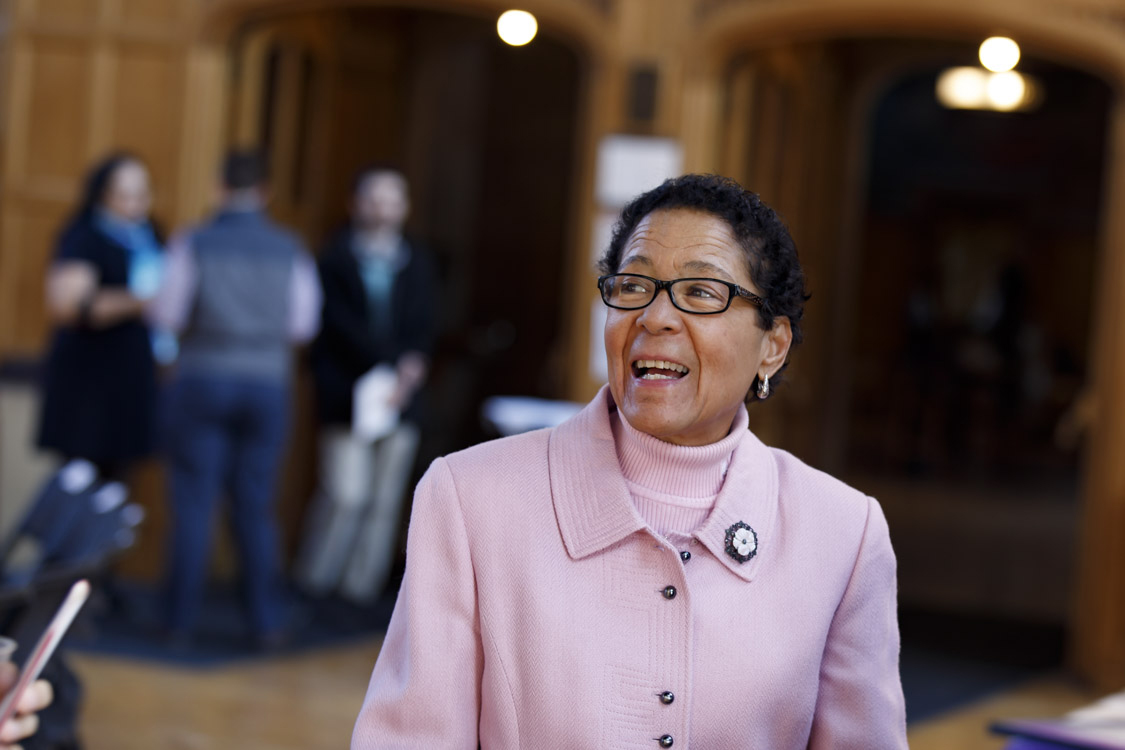Breaking Bread initiative awarded Perkins Prize
By Nancy Doolittle

Breaking Bread – an initiative of Intercultural Programs in the Center for Intercultural Dialogue that brings together participants from different communities, identities, groups and organizations for dinner and facilitated discussions – received the James A. Perkins Prize for Interracial and Intercultural Peace and Harmony March 21 in Willard Straight Hall.
The Perkins Prize is awarded annually to honor the Cornell individual or program making the most significant contribution to furthering the ideal of university community while respecting values of racial diversity.
Interim President Hunter Rawlings presented the $5,000 prize to Renee Alexander ’74, associate dean of students, who typically leads discussion groups at the Breaking Bread events.
Rawlings called the prize “Cornell’s highest award for those who work to achieve social, gender, ethnic, sexual identity and racial equality on our campus and beyond.” He said the Breaking Bread initiative advances Ezra Cornell’s founding principle of “any person, any study” and furthers the university’s commitment to diversity and inclusion.
Breaking Bread has brought together trustees and students, Cornell Democrats and Republicans, and fraternities and sororities in rigorous discussion, encouraging engagement across disagreement, Rawlings said.
Over the past year, Breaking Bread has hosted 20 events – 17 small-group and three campuswide – with more than 600 participants. Last November, one of its larger, campuswide events, “Post-Election America,” drew 250 people. Its other large conversations were on “Race, Religion and Campus Climate” and “Freedom of Speech and Civility in America.”
Its small-group discussions have explored belief systems, world views, preconceived notions, biases and stereotypes, and often have led to collaborative student efforts.
In his letter nominating Breaking Bread for the Perkins Prize, the Rev. Kenneth I. Clarke Sr., director of Cornell United Religious Work, wrote, “Breaking Bread is a model for building a cooperative community, respecting diversity and fostering important discussions and action in difficult times.”
Honorable mentions went to the Native American Students at Cornell (NASAC) and Black Students United (BSU). NASAC worked to achieve broader awareness of indigenous people’s presence in the Cornell community, culminating in a series of campus activities, Indigenous Peoples’ Week, last fall. BSU’s List of Demands campaign prompted a movement to improve the campus environment for all students, providing impetus this year to collaborate with senior administration in planning the Africana dedication and commemoration ceremony; promote the renaming of Cornell Plantations to Cornell Botanic Gardens; and advocate for the divestment of the university from the private-prison industry.
The Perkins Prize was created and endowed by Cornell Trustee Emeritus Thomas W. Jones ’69, MRP ’72, to honor James A. Perkins, Cornell president from 1963 to 1969. Jones, who attended the ceremony, recalled first meeting Rawlings at the awarding of the Perkins Prize in 1995. He is founder and principal of the private equity investment firm TWJ Capital and has served on the Weill Cornell Medicine Board of Overseers.
Media Contact
Get Cornell news delivered right to your inbox.
Subscribe